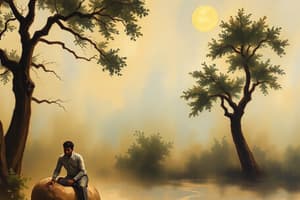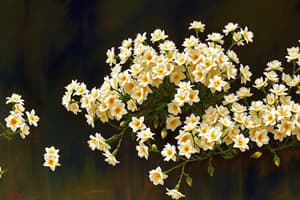Podcast
Questions and Answers
Gujarati language originated from Sanskrit in ancient times.
Gujarati language originated from Sanskrit in ancient times.
True (A)
Prakrit languages appeared around the third century BC and eventually developed into Gujarati.
Prakrit languages appeared around the third century BC and eventually developed into Gujarati.
False (B)
Gujarati may have existed even before the third century AD as one of the descendants of the Old Indo Aryan family.
Gujarati may have existed even before the third century AD as one of the descendants of the Old Indo Aryan family.
True (A)
Gujarati shares features with other Indic languages such as French, German, and Spanish.
Gujarati shares features with other Indic languages such as French, German, and Spanish.
Arab invaders had no influence on the development of Gujarati.
Arab invaders had no influence on the development of Gujarati.
Portuguese colonization during the Age of Discovery had no impact on the evolution of Modern Gujarati.
Portuguese colonization during the Age of Discovery had no impact on the evolution of Modern Gujarati.
Modern Gujarati forms are very similar to its older roots with no significant differences.
Modern Gujarati forms are very similar to its older roots with no significant differences.
Gujarati is classified among the Dravidian Family languages.
Gujarati is classified among the Dravidian Family languages.
The influence of Arab invaders led to changes only in vocabulary but not in pronunciations or grammar.
The influence of Arab invaders led to changes only in vocabulary but not in pronunciations or grammar.
Gujarati is a completely isolated language with no shared characteristics with other languages.
Gujarati is a completely isolated language with no shared characteristics with other languages.
Flashcards are hidden until you start studying
Study Notes
Gujarati Language History
The origin of the Gujarati language dates back to ancient times when Sanskrit was widely used by scholars, ruling classes, and merchants across India. In its early developmental stages around the third century AD, Prakrit languages began to appear. These included Ardhamagadhi, which later developed into Gujarati. Some historians suggest that Gujarati may have existed even before this time period and is considered one of the descendants of the Old Indo Aryan family. As a result, it shares many features with other Indic languages such as Marathi, Hindi, Malayalam, Kannada, Tamil, Telugu, and Punjabi.
In the course of several centuries, the influence of Arab invaders led to significant changes in pronunciations, vocabulary, grammar, and script, giving rise to Medieval Gujarati. By the fifteenth and sixteenth centuries, there were further developments due to Portuguese colonization during the Age of Discovery, leading to the evolution of Modern Gujarati. According to linguist Eleanor Rosch, these modern forms are markedly different from Gujarati's older roots, although it still retains some shared characteristics.
Gujarati has been classified among the Dravidian Family languages based on its phonology, syntax, semantics, morphology, and writing system. However, contemporary scholarship prefers classifying Gujarati within the South Asian languages category since the Dravidian classification does not cover all aspects of Gujarati and its relationship to other languages like English or French.
Today, Gujarati is spoken primarily in western parts of India, particularly in Gujarat state—where it serves as both the official and national language—and also in neighboring states like Maharashtra and Rajasthan. It is also commonly used in Pakistan where some population speaks it in Karachi and Hyderabad. Over time, Gujarati has evolved significantly; however, it remains close to its medieval form and has largely retained its core structure.
Studying That Suits You
Use AI to generate personalized quizzes and flashcards to suit your learning preferences.




